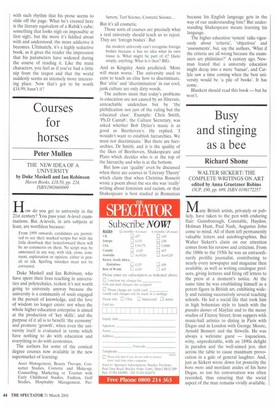Courses for horses
Peter Mullen
THE NEW IDEA OF A UNIVERSITY by Duke Maskell and Ian Robinson Haven Books, £18.50, pp. 224, ISBN1903660009 How do you get to university in the 21st century? You pass your A-level examinations. But A-levels, in arts subjects at least, are worthless because:
From 1999 onwards, candidates are permitted to see their marked scripts but with the little drawback that henceforward there will be no comments on them. No script may be annotated in any way, with tick, cross, comment, explanation or opinion, either in pencil or ink. Spelling mistakes must not be corrected.
Duke Maskell and Ian Robinson, who have spent their lives teaching in universities and polytechnics, reckon it's not worth going to university anyway because the university is a community of souls engaged in the pursuit of knowledge, and the love of wisdom no longer exists: not when the whole higher education enterprise is aimed at the production of 'key skills', and the purpose of it all is to benefit 'the economy' and promote 'growth', when even the university itself is evaluated in terms which have nothing to do with education and everything to do with economics.
The authors list some of the comical degree courses now available in the new supermarket of learning:
Asset Management, Beauty Therapy, Consumer Studies. Costume and Make-up, Counselling, Marketing or Tourism with Early Childhood Studies, Fashion, Golf Studies, Hospitality Management, Per fumery, Turf Science, Cosmetic Science...
But it's all cosmetic.
Those sorts of courses are precisely what a real university should teach us to reject. They are 'foreign bodies'. But
the modern university can't recognise foreign bodies because it has no idea what its own tissue is. What might be part of it? Quite simply, anything. What is it then? BIG.
And as Kingsley Amis predicted, 'More will mean worse.' The university used to exist to teach an elite how to discriminate. But 'elite' and 'discrimination' in our cool, junk culture are only dirty words.
The authors insist that today's problems in education are not caused by an illiterate, unteachable underclass but by 'the plebification not just of the ruling but the educated class'. Example: Chris Smith, Ph.D Cantab', the Culture Secretary, was asked whether Bob Dylan's music is as good as Beethoven's. He replied, 'I wouldn't want to establish hierarchies. We must not discriminate.' But there are hierarchies, Dr Smith, and it is the quality of the likes of Beethoven, Shakespeare and Plato which decides who is at the top of the hierarchy and who is at the bottom.
But how can 'quality' even be discussed when there are courses in 'Literary Theory' which claim that when Christina Rossetti wrote a poem about the sea she was 'really' writing about feminism and racism, or that Shakespeare is best studied in Romanian
because his English language gets in the way of our understanding him? But understanding Shakespeare means learning his language.
The higher education 'system' talks vigorously about 'criteria', 'objectives' and 'assessments', but, say the authors, 'What if the criteria are all wrong because the examiners are philistines?' A century ago, Newman feared that a university education might decay into a mere 'bazaar', and Carlyle saw a time coming when the best university would be 'a pile of books'. It has come.
Blunkett should read this book — but he won't.


























































































 Previous page
Previous page